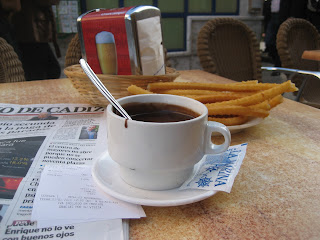Considering what an absolute administrative nightmare it was for me to obtain my temporary student visa from the Spanish Consulate in New York back in November, I decided to take Merche up on her offer to accompany me to the Policia Nacional in Puerto Real to complete the paperwork in order to obtain the coveted international student ID.
A side note for background purposes -- I use the term "administrative nightmare" in the purest sense because that's exactly what it was. For someone 18 years of age or older to get a (legal) student visa in Spain (I don't know the requirements for other countries, though I suspect if they are members of the Schengen countries the requirements are the same), she/he must submit to the Spanish Consulate nearest the place of permanent residence:
- two application forms,
- a valid passport (must be surrendered to have visa affixed by consulate),
- two passport photos,
- a letter of acceptance from the institution from which she/he is studying,
- proof of health insurance for the duration of stay,
- proof of financial means of at least $1,000/month for room and board,
- a money order for the $140 non-refundable student visa fee (the most expensive of all types of visas),
- a police records certificate for the past five years requiring a fingerprint background check and bearing the "Apostille of the Hague Convention",
- a signed doctor's statement of good health
OK, so while I agree the required documentation seems applicable and relevant to studying abroad, the kicker is that beginning October 1 of last year, for U.S. citizens (like, from where else are people applying for visas at the Spanish Consulate in New York going to be?), ONLY records issued by the FBI are valid, meaning a police records certificate from any other jurisdiction (i.e. city, state) is not valid. And did I mention it's a 12 week turnaround to obtain this FBI background check? And that all requests for said background check must be made to the FBI Criminal Justice Information Services Division in West Virginia via snail mail (huh?!). Furthermore, in order to make an appointment with the Spanish Consulate you must have assembled all of the required documentation and apply for an appointment on-line, which toward the end of last year required a 4-6 week waiting period. Oh, and lastly, it takes on average 7 weeks after the scheduled appointment for the visa to be processed, meaning the paperwork travels to Spain and back for processing. I'm not kidding.
Without going into the gory details that can only come into existence for a resident of my beloved New York City, I sincerely hope you can appreciate that the whole "obtaining a student visa to study in Spain" experience turned into quite an ordeal. And since I didn't even know I was accepted into the program at Universidad de Cadiz until mid-October, with classes beginning January 10, traveling to Spain to study for a year had turned into somewhat of a predicament. Yet, miraculously, I somehow managed to get my passport back with said visa in time for my January 4 flight. A huge "muchas gracias!" to the good folks back at the Spanish Consulate in New York for not only putting up with me and my persistent, multiple inquiries (some may say
manic, but I think that's a strong word, don't you?), but for also making it happen.
And here I am, back in Spain -- as if all the administrative gymnastics state-side wasn't enough, the prize for obtaining the student visa is, as mentioned earlier, the international student ID. In fact, the visa that's permanently affixed to my passport is only good for three months. It's the student ID that will keep me here legally for the duration of my studies.
Sí, es verdad. Hay más por venir.



